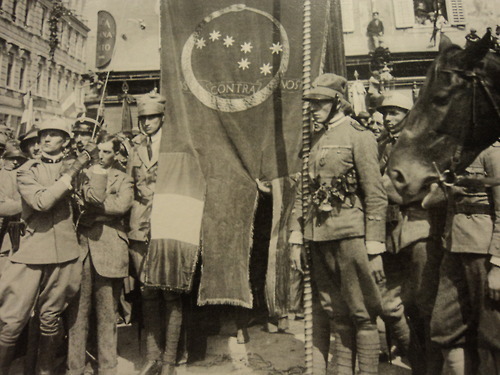The short lived Regency of Carnaro,After World War I the City of Fiume (now Rijeka, Croatia) was a m
The short lived Regency of Carnaro,After World War I the City of Fiume (now Rijeka, Croatia) was a major bone of contention between Italy and the other Allied Powers. The Italians fought hard against the Germans and Austro-Hungarians during World War I, and suffered terrible casualties. Thus they believed that Italy deserved a special reward for its part in the war. Italy especially wanted the Fiume, as it was a major port city in the Adriatic, and its population was 65% Italian. However, the newly formed nation called Yugoslavia also claimed the city. To settle the dispute, both sides entered into arbitration over the city, with American President Woodrow Wilson as arbiter. In the meantime, the City of Fiume was neutral territory directly managed by Allied forces.As arbitration between Italy and Yugoslavia dragged on, an Italian soldier, playwright, poet, and nationalist named Gabriele D'Annunzio decided that he would take the city by force. Using his influence within the Italian Army, he organized a force of 2,600 soldiers to capture Fiume. Occupying the city were a number of British, American, and French troops, all of whom were unprepared for an invasion. The war was over, after all, and the last thing the Allies expected was an assault on the city of Fiume. As a result, the Allies were easily beaten back by the rogue Italian forces, and without access to supplies and reinforcements were forced to abandon the city. D'Annunzio and his army marched into Fiume on September 12th, 1919 to the cheers of its Italian residents. After capturing the city, D'Annunzio then attempted to annex the territory to Italy. However, Italy blocked the move, declaring it illegal and declaring D'Annunzio’s men to be traitors and deserters. If Italy was going to refuse Fiume, D'Annunzio decided that the only course of action left was to declare independence for his newly conquered realm. He declared his new country the “Italian Regency of Carnaro”, and expanded its territory to include outlying areas around the city as well as the island of Veglia. A constitution was drawn up, setting up a fascist totalitarian regime in which D'Annunzio would reign as absolute dictator. Much of D'Annunzio’s new constitution would serve as a forerunner for later Italian fascism in the 1920’s up to World War II. In fact, D'Annunzio himself took up the title “Duce”, a title which would also be adopted by Italian dictator Benito Mussolini. In addition, the Regency of Carnaro printed its own money, organized its own civil service, created its own military, and printed its own stamps. All in all, the Regency of Carnaro was a fully sovereign, independent nation, albeit, only officially recognized by the Soviet Union.In 1920, Italy and Yugoslavia signed the Treaty of Rapallo, a compromise which made Fiume an independent country jointly managed by Italian and Yugoslav officials. D'Annunzio, of course, was not happy with this agreement, and rashly declared war with Italy. Unfortunately for D'Annunzio, the Regency wasn’t in any condition to fight a war with the Italian Army. After a five day battle, the Italian Army overran the city and the Regency of Carnaro collapsed. After the Regency of Carnaro debacle, Gabriele D'Annunzio returned home, and surprisingly wasn’t thrown in jail for treason. Rather, he became a famous politician, helping in the rise of Mussolini and the fascist party and often being described as the “John the Baptist of the Fascist Party”. Later, he became a political rival of Mussolini, and Mussolini responded by paying him off with the promise he would stay out of politics. Gabriel D'Annunzio died in 1938 of a stroke. He was given a state funeral after his death. -- source link
Tumblr Blog : peashooter85.tumblr.com
#history#countries#nations#italy#fascism#wwi#fiume#yugoslavia#gabriel d'annunzio


